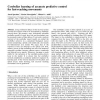4 search results - page 1 / 1 » Cerebellar learning of accurate predictive control for fast-... |
BC
2000
13 years 4 months ago
2000
Long conduction delays in the nervous system prevent the accurate control of movements by feedback control alone. We present a new, biologically plausible cerebellar model to study...
BC
1998
13 years 4 months ago
1998
This paper presents a mathematical model for the learning of accurate human arm movements. Its main features are that the movement is the superposition of smooth submovements, the ...
NIPS
2001
13 years 6 months ago
2001
Tangential hand velocity profiles of rapid human arm movements often appear as sequences of several bell-shaped acceleration-deceleration phases called submovements or movement un...
GECCO
2008
Springer
13 years 5 months ago
2008
Springer
While John Holland has always envisioned learning classifier systems (LCSs) as cognitive systems, most work on LCSs has focused on classification, datamining, and function appro...

